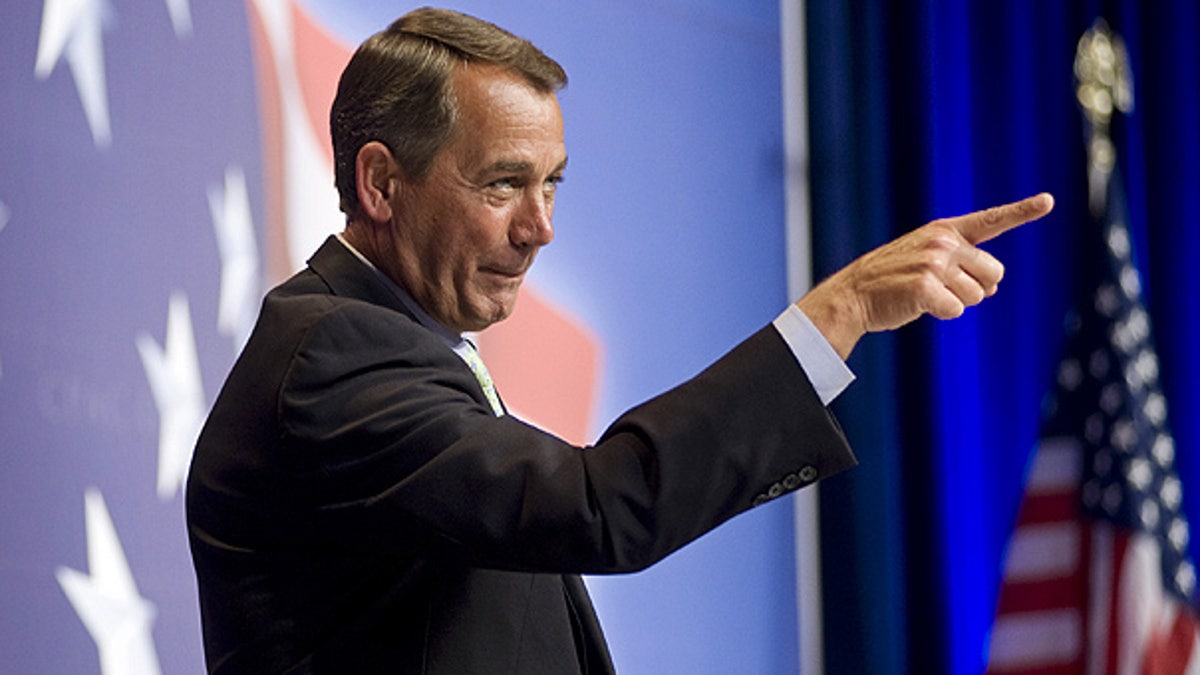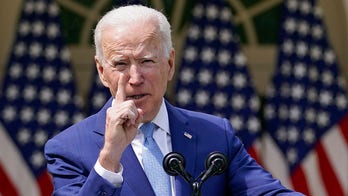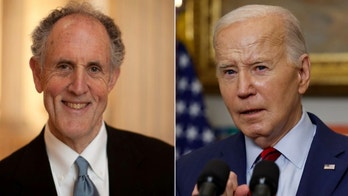
Feb. 18, 2010: Then-House Minority Leader John Boehner of Ohio addresses the Conservative Political Action Conference in Washington. (AP)
Democratic leaders confronted the reality Wednesday that they may not be able to pass the comprehensive health care overhaul sought by President Obama, while Republican leaders prepared to do everything in their power to make sure they can't.
House Republican Whip Eric Cantor declared in a memo that if the Senate goes ahead with plans to use a controversial legislative tactic known as reconciliation to pass the bill, House Speaker Nancy Pelosi "will not be able to muster the votes" to pass it in the House.
Speaking ahead of Obama's upcoming televised health summit, House Minority Leader John Boehner also told fellow Republicans in a closed-door event Tuesday: "We need to show up and crash the party," an aide told Reuters.
"We shouldn't let the White House have a six-hour taxpayer-funded infomercial on ObamaCare," Boehner said, suggesting the meeting was no more than a White House publicity stunt.
Both parties saw the president's revised, far-reaching proposal, released Monday, as a chance for Democrats to try to pass the legislation on their own under Senate rules that would bar Republican delaying tactics.
Senate Minority Leader Mitch McConnell, R-Ky., said the Obama administration appears determined "to try to jam it through under a seldom-used process," or budget reconciliation. The process would allow Democrats in the Senate to pass part of the bill with a simple, 51-vote majority.
But Cantor, in his memo, ran through the numbers in the House and estimated that Pelosi would only be able to hold together 203 votes at best -- far fewer than she needs. The bill originally passed the House last year by a narrow 220-215 vote.
Cantor argued that while Senate Majority Leader Harry Reid could afford to lose several Democratic senators over objections to the reconciliation process, Pelosi might not enjoy the same luxury.
Reid, though, tried to ease concerns about the tactic. He said reconciliation rules have been used 21 times since 1981, usually by Republicans.
"They should stop crying about reconciliation," Reid told reporters at the Capitol. "It's done almost every Congress, and they're the ones that used it more than anyone else."
McConnell invited some of Obama's sharpest critics, including the 2008 GOP presidential nominee, Sen. John McCain of Arizona, to join him. None of the GOP moderates who have raised the prospect of bipartisanship on health care, such as New Hampshire Sen. Judd Gregg or Maine Sen. Olympia Snowe, were included.
"We're happy to be there, but I'm not quite sure what the purpose is," McConnell said of the daylong summit. "It seems to me the president's already made up his mind."
Democrats were equally dismissive of GOP demands that they start from scratch.
"This idea that we have to start with a blank sheet of paper is ridiculous," said Sen. Bob Casey, D-Pa.
That's not to say Thursday's six-hour meeting will play no role in the long-running health care debate. As president, Obama is likely to dominate, but Republicans hope to use the session to criticize the Democratic plan's scope and cost, and to highlight their more modest alternatives.
Democrats are almost certain to portray the GOP alternatives as flimsy and unworkable. They hope the session will embolden rank-and-file Democratic lawmakers who face re-election this fall amid worries that public opposition to a full-scale overhaul of health care could doom them.
Failing to pass a bill would be even worse, party leaders say.
Barring an unlikely bipartisan breakthrough, all but a handful of Democrats' votes will be needed to pass the legislation under Senate budget reconciliation rules, which would disallow GOP filibusters. Democrats control 59 of the Senate's 100 seats. But they lost their ability to overcome Republican-led filibusters when GOP Sen. Scott Brown won a seat in Massachusetts last month.
The reconciliation strategy would require House Democrats to swallow several objections and approve a bill the Senate passed in December. Then Senate Democrats, under budget reconciliation rules, would have to make several changes demanded by the House and White House.
Sen. Joe Lieberman, a self-described "independent Democrat" from Connecticut, emerged from a Democratic strategy session Tuesday and said the health care legislation's prognosis is "unclear but clearly heading toward reconciliation."
But it's unclear whether the House or Senate can muster the votes required by the strategy. As many as 10 Democrats who backed the House version in November -- when it passed 220 to 215 -- have said they may abandon the revised legislation because it contains somewhat more permissive language on access to abortion in government-sanctioned insurance exchanges.
Rep. Bart Stupak, D-Mich., sponsor of stricter limits on federal funds for abortion in the House bill, raised concerns about the Obama plan without issuing an ultimatum.
"While the president has laid out a health care proposal that brings us closer to resolving our differences, there is still work to be done before Congress can pass comprehensive health care reform," Stupak said in a statement.
At the same time, Obama's allies hope to woo some of the 39 House Democrats who voted against the bill in November because the revised plan contains no public insurance option to compete with private companies.
Many House Democrats attended a closed meeting Tuesday at which pollster Celinda Lake said many elderly Americans fear the Obama plans could harm Medicare.
The White House said three dozen lawmakers, plus several administration officials, will sit at a hollow square table with name placards on Thursday. Leaders of both parties will speak. Obama will lead discussions on controlling health care costs and expanding coverage. Vice President Joe Biden will head a discussion on deficit reduction. Health and Human Services Secretary Kathleen Sebelius will lead talks on insurance reform.
House Speaker Nancy Pelosi invited four colleagues Tuesday, in addition to previously announced committee chairmen, to attend: Reps. Rob Andrews of New Jersey, Xavier Becerra of California, Jim Cooper of Tennesse and Louise Slaughter of New York.
McConnell tapped GOP senators McCain, Lamar Alexander of Tennessee, John Barrasso of Wyoming and Tom Coburn of Oklahoma, in addition to key committee leaders.
For Obama, the toughest chore will come in the following days and weeks. He will have to persuade wavering Democratic lawmakers if the health care package is to become law, several members of Congress said Tuesday.
"The president has to get involved big time," said Sen. Barbara Mikulski, D-Md. Especially for House Democrats, she said, "it's a heavy lift."
To get the Capitol Hill perspective on the summit read Chief Political Correspondent Carl Cameron’s piece, "Health Care Summiting Players to Watch."
To get the White House perspective on the summit read Senior White House Correspondent Major Garret's piece "White House Stops Playing Defense on Health Care."
The Associated Press contributed to this report.




